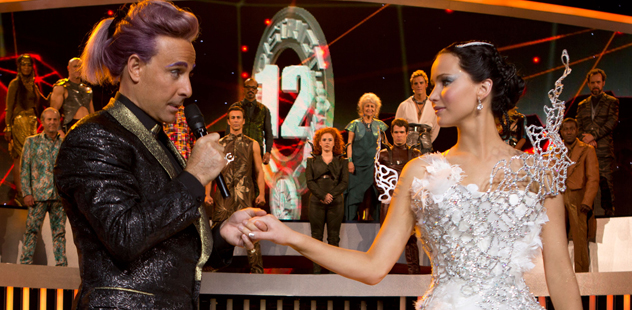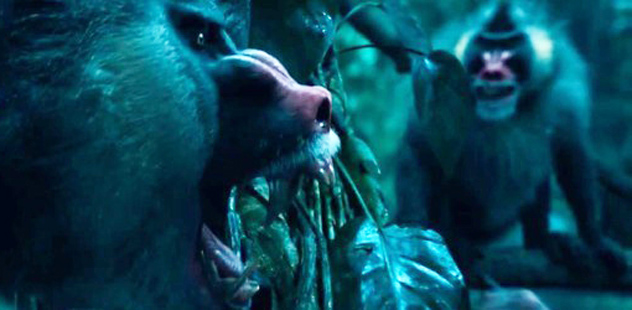
The Hunger Games: Catching Fire
Rated PG-13
“No, I am your father.”
Darth Vader intoned these grave words to a devastated Luke Skywalker, who’d just had his hand light-sabered off. It was the most pivotal scene in The Empire Strikes Back, the darkest movie of the original Star Wars trilogy—the lowest point where it seemed that all hope was lost for the Rebellion.
In that tradition, we have The Hunger Games: Catching Fire, the second installment in the wildly popular trilogy based on Suzanne Collins’ novels. Though the first Hunger Games wasn’t exactly bright and cheery (it did feature the senseless—and oft-times brutal—slaughter of young people), it did end on an up-tick. Our heroes, Peeta Mellark (played by Josh Hutcherson) and Katniss Everdeen (Jennifer Lawrence), thumbed their noses at “the man” and opted for dual suicide in lieu of killing one another. Since the powers that be needed a winner to preserve the relevance of their twisted contest and, in so doing, flex their political muscle, an impromptu rule change was enacted to declare them as co-winners of The Hunger Games.
In the first film, Katniss, Peeta and their team of mentors, stylists and publicists propagated a fiction that the two were star-crossed lovers, and it worked. The people of Panem (the country that emerged from the ashes of America) ate it up, and the two became pop-culture icons. In Catching Fire, Katniss and Peeta reap the consequences of their actions.
A rift has formed between the two “lovers.” Katniss is torn between her feelings for her childhood friend Gale (Liam Hemsworth) and her much more complicated relationship with Peeta, to whom she feels indebted. But it’s not just a simple love triangle. Outside pressures are also at work. Their act of defiance in the game arena has given hope to a burgeoning resistance against the Capitol, and seemingly omnipotent President Snow (Donald Sutherland) is seeking to use Peeta and Katniss’ Romeo and Juliet appeal to appease the people and quell any sort of uprising. If they step out of line, however, their lives and the lives of everyone they care about are in danger.
So of course, on their victory tour of the 12 Districts of Panem, Peeta and Katniss do just that. Caught up in the moment, they speak off-the-cuff. As the spotlight becomes brighter, and the crowds become more hostile, they freeze up. President Snow is not pleased. The peasants are revolting (I’d say!). With the 75th Hunger Games approaching (the Quarter Quell as it’s called), Snow schemes with new Head Gamemaker Plutarch Heavensbee (Philip Seymour Hoffman) to tarnish the reputation of, and ultimately kill off, Katniss (and to a lesser extent Peeta). Katniss and Peeta are summoned back to the arena where they must face off against other past victors in a gruesome battle for survival.
Catching Fire is a really good movie for a lot of reasons. First, it’s exciting. The stakes rise exponentially as the film builds, methodically at times, toward its climax. First the story is personal: How will Katniss reconcile her relationships with Gale and Peeta? But the mounting danger soon becomes bigger than just our principal players: thousands of people’s lives begin to depend on whether or not Katniss and Peeta can portray a convincing couple.
Then comes the action. The arena they’re tossed into is a dense, humid rain forest. Harsh elements, ferocious fauna and even poisonous fog—let alone the other competitors out to kill them—make survival an almost impossible task. Scenes in the arena are more suspenseful than necessarily action-packed, giving Catching Fire an almost horror movie feel. It’s a nice twist, and makes for a very thrilling experience.
It’s also well acted. Sutherland and Hoffman (and even Stanley Tucci in the comedic-yet-sinister role of talk show host Caesar Flickerman) add serious credibility to the film with their chilling and calculated performances. Elizabeth Banks also lends a tender soul to flamboyant publicist Effie Trinket. But Lawrence and Hutcherson are charged with most of the heavy lifting and both carry the film effortlessly. Lawrence especially shines as the strong-willed heroine, portraying the type of female character you wouldn’t mind your daughter looking up to.
It would be easy for The Hunger Games films to descend into schmaltzy romance, but Catching Fire never does. Much like Collins’ novels, there is a stark message behind what’s going on. Sure, this isn’t new territory. We’ve all seen the post-apocalyptic world ruled by a despotic government a hundred times. But Collins, in focusing on two well-meaning, salt-of-the-earth teens, makes the situation feel remarkably intimate (aided by first-person narrative of the books). In the films, Collins’ imagery is really fleshed out. Allusions to the Roman Empire are used liberally. The concept of the Hunger Games may be far-fetched, but it’s not like it hasn’t happened before. Gladiators battled to the death for the amusement of spectators, and now, to a lesser extent, contestants battle the elements on Survivor. Will we ever be glued to our screens to watch as Kim Kardashian strangles Big Ang from Mob Wives with a string of barbed wire? Probably not, but what if…?
Catching Fire ends on a dark note, much like The Empire Strikes Back, setting up what should be a fantastic conclusion in the two-part Mockingjay (first part due in theaters in 2014). I doubt there will be Ewoks, but I’m sure it will be just as memorable as when we said good-bye to Luke, Han and Leia.




Comments